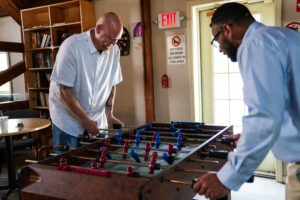When outpatient treatment hasn’t worked or addiction has reached a crisis point, residential rehab offers the intensive, immersive experience necessary to break the cycle of substance use and build a foundation for lasting recovery. This level of care removes you from triggers and distractions, allowing complete focus on healing and developing the skills needed for successful long-term sobriety.
Residential rehab represents more than just a place to stay while getting treatment—it’s a carefully structured environment designed to address every aspect of addiction recovery. From medical detox through therapeutic programming to aftercare planning, residential treatment provides comprehensive support during the most vulnerable and crucial phase of recovery.
The Power of Complete Immersion
The residential environment creates what addiction specialists call a “therapeutic milieu”—a healing community where every interaction, activity, and routine supports recovery goals. Unlike outpatient treatment where you return to the same environment that contributed to your addiction, residential rehab provides a complete break from familiar triggers and patterns.
This immersion allows for intensive work on underlying issues that drive addiction. Without the distractions of work, relationships, and daily stressors, you can focus entirely on understanding your addiction, processing trauma, addressing mental health concerns, and learning new coping strategies. The structured daily routine helps rebuild healthy habits while providing stability during early recovery.
The 24/7 medical supervision ensures safety during detox and early recovery while providing immediate support when challenges arise. This level of care is particularly important for people withdrawing from alcohol, benzodiazepines, or other substances that can cause dangerous withdrawal symptoms.
Comprehensive Treatment Addressing Root Causes
Effective residential rehab recognizes that addiction affects people physically, emotionally, psychologically, and spiritually. The best programs address all these dimensions through integrated treatment approaches that go far beyond just stopping substance use.
Medical care addresses the physical aspects of addiction and any health problems caused by substance use. Psychiatric services handle co-occurring mental health conditions like depression, anxiety, or trauma that often underlie addiction. Individual therapy helps process personal issues and develop coping strategies, while group therapy provides peer support and social skills development.
Activity-based therapies like art therapy, recreational therapy, or outdoor programs help rediscover interests and talents that addiction may have suppressed. These activities also teach healthy ways to manage emotions and stress while building self-esteem and confidence.
The holistic approach includes attention to nutrition, physical fitness, and overall wellness. Many people entering residential treatment are malnourished or physically depleted from substance use. Licensed dietitians and fitness programs help restore physical health while teaching sustainable wellness practices.
Creating a New Identity in Recovery
One of the most powerful aspects of residential treatment is how it allows you to discover who you are without substances. Many people have used drugs or alcohol for so long that they don’t remember their authentic personality, interests, or values. The residential environment provides space and support for this rediscovery.
Gender-specific groups address issues that are particularly relevant to men or women in recovery, while specialized programming serves specific populations like veterans, young adults, or LGBTQIA+ individuals. This targeted approach ensures that everyone receives culturally competent care that addresses their unique experiences and needs.
The peer community in residential treatment becomes a laboratory for practicing new social skills and building healthy relationships. Learning to connect with others without substances, handle conflict constructively, and give and receive support are crucial skills that develop naturally in the residential environment.
Family Healing and Preparation for Return
Residential rehab understands that addiction affects entire families and that healing these relationships is essential for long-term success. Weekly family therapy sessions help address the hurt, mistrust, and dysfunctional patterns that addiction created while teaching families how to support recovery effectively.
Family education programs help relatives understand addiction as a disease rather than a moral failing, reducing shame and blame while building realistic expectations for recovery. Families learn about enabling behaviors, healthy boundaries, and how to take care of their own mental health during the recovery process.
The residential setting also allows families to visit and participate in treatment in ways that wouldn’t be possible with outpatient care. Family weekends and special events help rebuild relationships while everyone learns new ways of relating that support sobriety.
Preparing for Real-World Recovery
While residential treatment provides a protected environment for initial healing, the best programs spend considerable time preparing residents for the challenges of returning to their regular lives. This includes extensive aftercare planning that begins on admission and continues throughout treatment.
Relapse prevention strategies are practiced and refined throughout residential treatment. Residents learn to identify personal triggers, develop coping strategies, and create action plans for high-risk situations. The residential environment provides opportunities to practice these skills in a supportive setting before facing real-world challenges.
Aftercare coordination connects residents with ongoing support services in their home communities, including outpatient therapy, support groups, sober living options, and other resources that will support long-term recovery. The goal is to ensure continuity of care rather than ending support when residential treatment ends.
Swift River’s Residential Excellence
Swift River’s Massachusetts residential facility exemplifies comprehensive, compassionate residential care. Their structured program begins with medically supervised detox that ensures safety and comfort during withdrawal, followed by intensive residential programming that addresses addiction from multiple angles.
The facility’s unique features include a pet-friendly environment that allows emotional support animals, recognizing the therapeutic value of human-animal bonds during recovery. Their LGBTQIA+ friendly approach ensures that all residents feel welcomed and respected regardless of sexual orientation or gender identity.
Swift River’s holistic treatment model integrates traditional evidence-based therapies with complementary approaches that address mind, body, and spirit. Their on-site wellness center supports physical recovery while licensed dietitians help restore nutritional health that substance use may have compromised.
The program’s emphasis on individualized care means that each resident receives treatment tailored to their specific needs, circumstances, and goals. This personalized approach, combined with the structured residential environment, creates optimal conditions for sustainable recovery.
Making the Decision for Residential Care
Choosing residential rehab represents a significant commitment to recovery that requires courage and honesty about the level of help you need. While it means temporarily stepping away from regular life responsibilities, this investment in intensive treatment often prevents the far greater disruptions that continued addiction would cause.
Residential treatment works best for people who have tried outpatient options without success, those with severe addictions, individuals with co-occurring mental health conditions, or anyone who lacks a stable, supportive home environment for recovery. It’s also valuable for people who want to make dramatic changes in their lives and need the intensive support that only residential care can provide.
The decision to enter residential treatment is ultimately an investment in reclaiming your life from addiction. The intensive, immersive experience provides the foundation for long-term recovery while developing the skills and support systems necessary for maintaining sobriety long after treatment ends.












